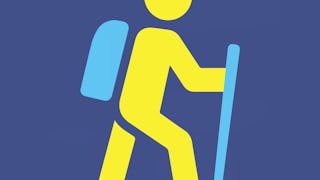Learn how to incorporate resilience interventions into your personal and professional life with Dr. Karen Reivich. In this course, you are exposed to the foundational research in resilience, including protective factors such as mental agility and optimism. Several types of resilience interventions are explored including cognitive strategies; strategies to manage anxiety and increase positive emotions such as gratitude; and a critical relationship enhancement skill. Throughout the course, you will hear examples of individuals using resilience skills in their personal and professional lives. Suggested prerequisites: Positive Psychology: Martin E. P. Seligman’s Visionary Science, Positive Psychology: Applications and Interventions and Positive Psychology: Character, Grit & Research Methods.



Positive Psychology: Resilience Skills
This course is part of Foundations of Positive Psychology Specialization

Instructor: Karen Reivich, Ph.D.
96,065 already enrolled
Included with
(2,291 reviews)
What you'll learn
Understand the protective factors that make one resilient
Describe thinking traps and how they undercut resilience
Make use of non-cognitive strategies that decrease anxiety
Create a buffer of positivity that boosts resilience in stressful situations
Skills you'll gain
Details to know

Add to your LinkedIn profile
See how employees at top companies are mastering in-demand skills

Build your subject-matter expertise
- Learn new concepts from industry experts
- Gain a foundational understanding of a subject or tool
- Develop job-relevant skills with hands-on projects
- Earn a shareable career certificate

There are 4 modules in this course
In this module, you will learn the definition of resilience and understand the protective factors that make one resilient. You will differentiate between helplessness and mastery orientations, and understand the thinking styles underlying each. You will summarize major outcomes of optimism, and the mediators of those outcomes, as well as assess your own levels of optimism, using a questionnaire. Finally, you will hear about personal and organizational outcomes of optimism, and will be able to apply these concepts to your own life.
What's included
13 videos6 readings1 assignment1 peer review1 discussion prompt
In this module, you will learn about thinking traps and how they undercut resilience. You will learn about five common thinking traps and identify which you are prone to, in addition to the effects of those styles of thinking. You will practice Real-Time Resilience, a strategy to challenge non-resilient thinking. Finally, you will hear about personal and organizational outcomes of optimism, and plan how to apply these concepts to your own life.
What's included
8 videos2 readings1 assignment2 discussion prompts
In this module, you will learn the definition of catastrophic thinking and identify the effects it has on physiology, attention and contingency planning. You will experiment with several non-cognitive strategies to decrease anxiety, including Deliberate Breathing. You will be introduced to the Broaden and Build theory of positive emotions, and will be able to describe the effects of positive emotions on resilience. Finally, you will relate research and examples of gratitude to your own life and develop a plan for a gratitude practice.
What's included
14 videos4 readings1 assignment1 peer review2 discussion prompts
In this module, you will identify your own character strengths using a well-validated questionnaire. Next, you will describe how to use your character strengths in stressful situations to increase resilience by creating a buffer of positive emotion. Additionally, you will learn the research on active constructive responding, and identify their predominant responding style with important people in their lives. Finally, you will hear examples of inculcating resilience into organizations, and plan how to incorporate resilience strategies into your personal and professional lives.
What's included
9 videos3 readings1 assignment3 discussion prompts
Earn a career certificate
Add this credential to your LinkedIn profile, resume, or CV. Share it on social media and in your performance review.
Instructor

Offered by
Explore more from Psychology
 Status: Free Trial
Status: Free TrialUniversity of Colorado System
 Status: Free Trial
Status: Free TrialMacquarie University
 Status: Free Trial
Status: Free TrialUniversity of Pennsylvania
 Status: Free Trial
Status: Free TrialArizona State University
Why people choose Coursera for their career




Learner reviews
2,291 reviews
- 5 stars
90.76%
- 4 stars
7.75%
- 3 stars
0.87%
- 2 stars
0.26%
- 1 star
0.34%
Showing 3 of 2291
Reviewed on May 31, 2020
The course was really good. I had some idea of mindfulness but the course brought up some refreshing new concepts on resilience and it turned out to be really useful for me. Thank you so much Karen!
Reviewed on Apr 7, 2020
This was such an inspiring and life changing experience for me. I feel so much more capable of developing the skills I've learnt and work towards leading a happier, more content life
Reviewed on Oct 6, 2023
I gain the understanding of resilience, optimism, and related concepts. The course teaches valuable knowledge and tools to enhance psychological well-being and adaptability in the face of challenges.

Open new doors with Coursera Plus
Unlimited access to 10,000+ world-class courses, hands-on projects, and job-ready certificate programs - all included in your subscription
Advance your career with an online degree
Earn a degree from world-class universities - 100% online
Join over 3,400 global companies that choose Coursera for Business
Upskill your employees to excel in the digital economy
Frequently asked questions
To access the course materials, assignments and to earn a Certificate, you will need to purchase the Certificate experience when you enroll in a course. You can try a Free Trial instead, or apply for Financial Aid. The course may offer 'Full Course, No Certificate' instead. This option lets you see all course materials, submit required assessments, and get a final grade. This also means that you will not be able to purchase a Certificate experience.
When you enroll in the course, you get access to all of the courses in the Specialization, and you earn a certificate when you complete the work. Your electronic Certificate will be added to your Accomplishments page - from there, you can print your Certificate or add it to your LinkedIn profile.
Yes. In select learning programs, you can apply for financial aid or a scholarship if you can’t afford the enrollment fee. If fin aid or scholarship is available for your learning program selection, you’ll find a link to apply on the description page.
More questions
Financial aid available,
¹ Some assignments in this course are AI-graded. For these assignments, your data will be used in accordance with Coursera's Privacy Notice.

